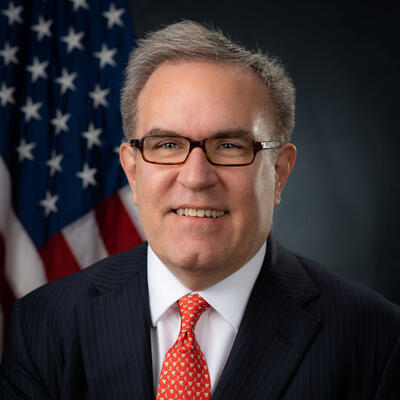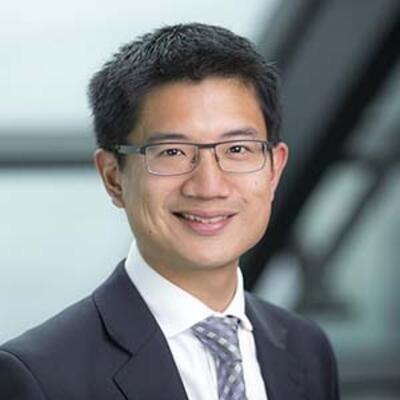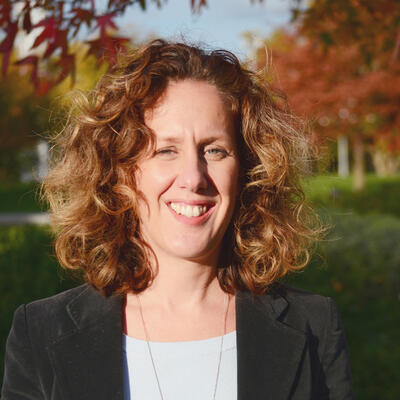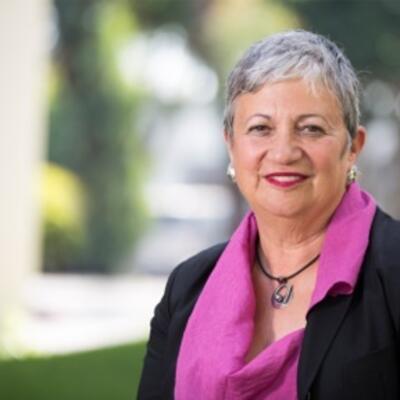
EPA Chief Andrew Wheeler on Cars, Coal, and Climate
Guests

Andrew Wheeler

Albert Cheung

Helen Clarkson

Mary Nichols
Summary
Greg Dalton sits down for a rare interview with newly-confirmed U.S. EPA Chief Andrew Wheeler on cars, coal, and climate. Mary Nichols, Chair of the California Air Resources Board, responds to Wheeler’s position on vehicle standards, and discusses her agency’s role leading a group of states in contesting the Trump administration’s revised auto emissions rules.
Also featuring Albert Cheung of Bloomberg New Energy Finance on the future of personal mobility, and Helen Clarkson of The Climate Group on getting some of the world’s biggest companies to commit to 100% renewable energy.
Full Transcript
ANNOUNCER: This is Climate One, changing the conversation about energy, the economy, and the environment.
Andrew Wheeler: It's not the job of the EPA, the authority of the EPA to pick winners and losers between the different fuel sources.
ANNOUNCER: Andrew Wheeler was recently confirmed by the US Senate as Administrator of the US Environmental Protection Agency.
Andrew Wheeler: I think it's important to make sure that we have a balance of fuel sources in order to make sure that we have electric power for everyone across the country. But again, that’s not the role of the EPA. Our job is to set the regulations that govern the industry.
ANNOUNCER: But some of that industry isn’t waiting on action from the federal government.
Helen Clarkson: We’re doing the innovation, we’re doing the work on figuring out how to sort out the CO2 in the finished product but in the meantime we will really make a commitment on energy efficiency. These markets are moving already but it’s really about accelerating and moving the pace on.
ANNOUNCER: EPA Chief Andrew Wheeler and more. Up next on Climate One.
ANNOUNCER: Climate One conversations – with oil companies and environmentalists, Republicans and Democrats – are recorded in San Francisco. I’m Greg Dalton.
I recently attended a conference on the future of personal mobility organized by Bloomberg New Energy Finance. I sat down with U.S. EPA Administrator Andrew Wheeler and other leaders to discuss how people will get around in a hot and crowded world.
Dalton: Administrator Wheeler, thanks for coming to Climate One.
Wheeler: Absolutely. Thanks for having me.
Dalton: During your Senate confirmation testimony, you said that climate change is not the greatest risk facing humanity, but at somewhere around an eight or nine on a scale of 10, so what is the Trump Administration doing to address at eight or nine challenge for humanity?
Wheeler: Sure. We're moving forward with our ACE proposal, the Affordable Clean Energy Act, which will reduce CO2 from the electric power segment. We're also moving forth our Cafe Standard, which will also reduce CO2. On the ACE Proposal, it's projected to get 33 to 34 percent reduction in CO2 in the electric power sector over the life of the regulation.
Dalton: Though I think there was a Harvard study that questioned whether that will really reduce reductions, reduce CO2 compared to the Obama Clean Power Plan, which I think that's trying to replace.
Wheeler: Well, you got to remember the Obama Clean Power Plan never took effect. It was stayed by the Supreme Court because, in my opinion, it went outside of the Clean Air Act. It's really hard to compare apples and oranges when you have a regulation that was never implemented outside the jurisdiction of the agency and the outside of the authority of the Clean Air Act versus a proposed regulation that follows the law, follows the Supreme Court precedents, and will reduce CO2.
Dalton: A lot of this was really about coal. Coal production, coal capacity in the United States is down about a third from 2010. Banks, insurance companies, hedge funds are all moving away from coal, as you well know. Do you really think that that easing regulations on coal will help bring back an industry that's in decline for lots of reasons?
Wheeler: I think the important thing here is that we're not tipping the scales. The Obama Administration tipped the scales away from coal. It's not the job of the EPA, the authority of the EPA to pick winners and losers between the different fuel sources. That would be either Department of Energy or FERC, or even more likely, the state PUCs. Our job is to set the regulations that govern the industry, and that's what we're doing, and it's, and we believe we have a responsible regulation that will reduce CO2 in the electrical power segment, following both the Clean Air Act and the Massachusetts versus EPA decision.
Dalton: There was an effort to require utilities to stockpile a bunch of coal, which even the Federal Energy Regulatory Commission didn't go there. That seems like a pretty clear effort to help coal by requiring power plants tends to stockpile coal
Wheeler: That is outside of the authority of the EPA, and I know the Department of Energy and FERC were looking into those issues. As far as their authorities are concerned, I think it's important to make sure that we have a balance of fuel sources in order to make sure that we have electric power for everyone across the country. But again, that's not the role of the EPA. Under the Obama Administration, the EPA really took that on as their role, which is not what the pavers set up to do.
Dalton: Some people said to me that it's really Texas frackers that hurt coal because it's cheap natural gas had hurt coal more than the Sierra Club or Obama. Do you think there's some truth in that? The Texas frackers really hurt coal?
Wheeler: There might be some truth to that, but if you have a coal-fired power plant, and you're trying to make a decision whether or not to put on additional equipment or shut it down, that's a big driver for the future of coal. I don't think you're going to look at, "Natural gas is cheap, so I'm gonna go ahead and shut down a functioning coal-fired power plant just because natural gas is cheap."
Albert Cheung: Look, coal power generation in the U.S. is increasingly uneconomic.
ANNOUNCER: Cheap natural gas is undercutting coal in US power markets. Moments after I sat down with Andrew Wheeler, I talked with Albert Cheung, Head of Global Analysis at Bloomberg New Energy Finance.
Albert Cheung: What’s happening is with the advent of cheap natural gas, and cheap renewables it’s driving power prices down. And those power prices are increasingly not able to support the price of coal. So I think the current administration are telling a narrative about environmental regulations and the idea that it’s regulations is killing the coal industry. I think it's really hard to make that case. I think what we've seen over the last several years is really a story about new technologies coming in and providing power generation at a lower cost.
ANNOUNCER: We’ll hear more from my conversation with Albert Cheung later in the program. Right now let’s hear more from EPA Administrator Andrew Wheeler
Dalton: We’re here talking at a Bloomberg Conference on Mobility. A lot of talk about the California waiver clean car standards. California and the federal government are kind of at a deadlock there. How's that gonna play out?
Wheeler: Well, hopefully we can end up with something as a regulation that California likes and can agree with, but California's only looking at it as one policy issue and that is energy efficiency. The Trump Administration, the federal government, we're looking at more than just one policy issue, including highway safety, lives saved. Our proposal will save 1,000 lives per year over and above the Obama proposal.
Dalton: Is that because of bigger cars? what's the basis for that?
Wheeler: It's older cars. Right now, people are keeping their cars longer because the high price of cars. The average lifespan for a car on the on the road, the average age of a car on the road, today is 12 years used to be eight years. People are holding onto their cars longer. When you buy a new car, you buy a more energy efficient car, you buy a safer car, and what we're trying to do with our Cafe Proposal is bring down the cost of a new car, which would bring us down around $2,300 per car on average. That will incentivize more people to buy newer, safer, more energy efficient cars.
Mary Nichols: Well there’s no factual support for that statement whatsoever.
ANNOUNCER: That’s Mary Nichols, California’s top air regulator. I also talked with her at the Bloomberg conference, where she held a private meeting with Andrew Wheeler. She responded to his contention that the Trump administration’s effort to relax fuel efficiency rules will save lives.
Mary Nichols: The administration tried to use the safety argument as an excuse for why they had to roll back on emissions and fuel economy. And since fuel economy improvements pretty obviously benefit consumers they had to try to pin it on the initial cost of the vehicles. Unfortunately, there just isn't any support for this argument, and in fact, it seems that the opposite is true. But from all of the comments that have come into the record now as a result of the Trump administration putting out this argument as part of their proposal to rollback the standards they’re gonna have a very hard time surviving a challenge to that decision just because the facts aren't there.
ANNOUNCER: We’ll hear more from Mary Nichols in just a bit. But let’s get back to EPA Chief Andrew Wheeler at the Bloomberg Conference on Mobility.
Dalton: Here at this conference, we've heard Audi and other companies touting about how there's going to be more EVs coming to market, and there was a poll taken at the audience here, and policy was a tiny part of what they thought would shape the future direction of the auto industry. The the top winners were really business models and consumer preferences, so it's not, according to this audience here, it's not policy driving the market.
Wheeler: Well, the Obama Administration tried to use policy to drive the market. We're not. We're, we're looking at the consumer data. We're looking at the same thing that the automobile manufacturers are looking at as far as what people want to buy, but what we're trying to do is set a standard that will save lives, bring down the cost of a new car. There's a lot of automakers who really like the idea of bringing down the cost of a new car $2,300 and getting more new cars sold.
Dalton: They also have said that they don't want to roll back of the auto emission standards. Ford has come out and said that. Other auto companies and said, "We want certainty. It's not good for industry, for the federal government and California to fight it out in court," and they don't know who's gonna win. So what about the voice of industry here who saying, "Hey, we want some clarity," which is what they always want?
Wheeler: Well, industry came to us the beginning of this administration and said that they can't meet the Obama standards going forward. Right now, they're not. If you look at the 2016 data, they paid $77,000,000 in penalties because they did not meet the 2016 Obama Cafe Standard, and that amount is supposed to increase dramatically over the next 10 years.
Dalton: Right. So how does this play out? Do you think that ended up in court, or is there going to be kind of a deal where either California gets those standards? California often drives national standards. That's been the history.
Wheeler: True. What we're looking at though is on the energy efficient CO2 side. We aren't taking away California's ability to set standards for the health based emissions from automobiles. That's very important. All We're looking at are the energy efficiency standards, not the health based standards. California has driven development of standards over the years, but we're trying to set a standard for the entire country.
Dalton: There's legislation in Congress now. Pricing carbon pollution is now on the table. Again, it hasn't been that way for about 10 years or so. There's something called the Carbon Dividend Plan that was co-authored by James Baker, George Shultz and supported by one of your predecessors, Christine Todd Whitman, Will Rob Walton the scion of the of the Walmart family, Ben Bernanke, also corporations, ExxonMobil, Shell, BP, Excellon, AT&T. This is the corporate and political establishment. What do you think of that plant?
Wheeler: Well, if the goal of the plan is to set a carbon tax.
Dalton: They call it a fee and dividend. Give money back to the people.
Wheeler: I've never seen a fee and dividend that actually gives 100 percent of the money back to the American public.
Dalton: They say this would be-
Wheeler: A carbon tax is one of the most regressive taxes you can put on the American public because lower income people, people on a fixed income, end up paying more of a percentage of their income. Well first of all, they paid more of a percentage of their income for energy today then people upper brackets, so it really does hurt lower income people, people on a fixed budget, and it's not just- I know they're talking about paying dividends back to people so they have a rebate for their gasoline or a rebate for their home heating and air conditioning, but what about the dividends to make up for the increased price on goods from the small businesses, from the restaurants, they go to? From the local McDonald's where they're paying more for their electricity? It's a regressive form of taxation. It may be economically one of the easier ways of addressing CO2, but it's really harmful to low income people.
Dalton: The backers say that most people, Americans would come out ahead. They would get more back from the plan than they would paying forward, which is why-
Wheeler: I think they're looking at the indirect costs that people pay for energy costs when it's increased prices on goods and services and what they paid, not just for their own heating and cooling bills with what they pay at the gas pump.
Dalton: And what is the way, if you say climate change is an eight or a nine, I heard you talk about the clean energy plan. What are the other ways to tackle climate change? Because we're seeing storms, fires and deaths in California. Storms are more severe, Houston, etc. It's getting very expensive.
Wheeler: It is a global issue. It's a global problem that needs to be addressed globally but not through a mechanism such as the Paris Climate Accord, which is really unfair to the United States, United States manufacturers, and United States citizens compared to the people who live in China or India or other countries. If you're going to address it, it has to be done globally. But also equally important is looking at adaptation and making sure that when a natural disaster strikes that we rebuild in order to sustain a larger storm surge. Things like that are very important.
Wheeler: As far as the California fires, and this is a topic that I got into in my confirmation. I believe the unofficial name is Little Hoover Institute here in California. The draft of the report based upon the fires, and they blame the, the forest management practices of the last hundred years more than climate change. I think it's important not to lose sight of that aspect because we really do need to have better forest management in order to stop the wild destructive fires that we've seen in recent years.
Dalton: There's forest management. I've interviewed some of the firefighters it's high winds, hot temperatures, a lot of fuel, low precipitation, lots of things kind of combined, no single factor.
Wheeler: But we can't say that this was just because of climate change, which a number of people try to do.
Dalton: Sure. But would you say that it's amplified or turbo charged by, but not caused by? Anyone of Barry Bonds’ home runs-
Wheeler: How do you define turbo charge? It's a factor.
Dalton: Right? We say here in San Francisco that we know that you can't attribute any one of Barry Bonds home runs to juicing, but we know that some of those 750 home runs wouldn't have happened without steroids. Last word in terms of, going forward, do you feel a sense of urgency on climate change or is this something that technology will solve and we have time to work on?
Wheeler: I have a lot of faith in technology. When I said at my hearing that climate change is not the biggest crisis we faced worldwide on the environmental side, I think our biggest crisis is on water and potable water, and the fact that we have a million children and people dying each year from lack of sanitary ...
Dalton: Clean drinking water.
Wheeler: Clean drinking water. Right, exactly. I think that is a huge crisis. If we spent a fraction of what we're spending on climate change to provide those people with safe drinking water. We'd be saving a million lives a year. that is a crisis today.
Dalton: Right. Andrew Wheeler. Thanks for your time today.
Wheeler: Thank you.
ANNOUNCER: You’re listening to a Climate One. Coming up, we’ll hear more of my conversations with Albert Cheung and Mary Nichols.
Mary Nichols: Some people have predicted that the cost of EVs is going to fall dramatically and they're making very bullish statements about the future of electric vehicles. I hope that they're correct.
ANNOUNCER: That’s up next, when Climate One continues.
ANNOUNCER: Climate One continues now with more of my interview with Mary Nichols. She’s Chair of the California Air Resources Board, a position she’s held since Governor Arnold Schwarzenegger appointed her in 2007. I began by asking about the negotiations between California and the federal government over auto emissions standards.
Mary Nichols: The federal government, although they invited us several times to come to Washington to talk has taken the position that we are just one stakeholder and therefore they couldn't possibly, you know, just negotiate with us. The difficulty that the political appointees have is that President Trump announced and was quoted widely after he met with the auto executives telling then Administrator Pruitt and Secretary Chao from DOT that he wanted to go and negotiate with California. So as with many things that happen with this administration there appeared to be two different narratives, at least, and maybe more about what's really going on.
Greg Dalton: So where is this headed, is it headed to a deal, is it headed to court?
Mary Nichols: At the moment I would have to say it’s headed to court just in the sense that we haven't seen any sign that the administration is planning to pull back from the very extreme proposal they put out. Senator Carper from Delaware who is the ranking Democrat in the Senate on environment cited some information which I believe he was privy to that says that the final regulation when it comes out is not going to be for zero improvement it's going to be something closer to half a percent a year as opposed to the 5% a year that was called for under the current role. So that way they could say they still had something about regulation it just won't be anything like what was originally on the books.
Greg Dalton: Does the change from Jerry Brown to Governor Newsom have an impact on this poker game played with the Trump administration?
Mary Nichols: Well, inevitably bringing in a new personality is gonna have an impact, but so far every indication I've seen is that the new governor, Governor Newsom is, if anything, even more committed to maintaining California's cutting edge when it comes to clean technologies, advanced environmental principles. He is steering us in the direction of adding more effort to work with the transportation planners with the cities land-use authorities to try to focus on urban planning and to find ways to reduce the need to drive and the amount of driving in urban areas, including by building more housing in the urban areas. So he sees these issues as very much connected, which of course they are but they tend to fall into different camps when it comes to different agencies. So I'm looking forward to seeing a lot more activity and frankly interacting more with colleagues in other parts of the administration on these issues.
Greg Dalton: We’re here at a conference where a lot of auto companies are present from Audi, which you’ve busted and Porsche, etc. They’re saying there’s gonna be what 50% EVs something in 20 years. What are you gathering from this automakers here today?
Mary Nichols: Well some people, including Bloomberg themselves have predicted that the cost of EVs is going to fall dramatically and they're making very, very bullish statements about the future of electric vehicles. I hope that they're correct. I don't think it's inevitable that this is going to happen and I don't think the major obstacle is the car companies themselves. I think they are designing and producing very attractive vehicles. There are really a couple of limiting factors. One is the batteries themselves. We still need breakthroughs in battery technology so that we can have a much longer lived battery and more easily rechargeable and easily disposable. There’s just gonna have to be some continuing improvement in the quality of the batteries. And then the other is in the charging infrastructure that people don't want to invest at least in many instances unless they're pretty sure that they know where and how they're going to be able to charge. And people who have, you know, the ability to do that at home are certainly the first adopters but that's not even half of the public that we need to be getting to. So finding ways not only to bring these cars to communities where people tend to live in apartments but also to figure out how they're going to charge at work how the services that provide ridesharing, ride hailing are going to become electric. These are all still issues that need to be addressed.
ANNOUNCER: Mary Nichols is Chair of the California Air Resources Board. You’re listening to Climate One, and a series conversations recorded at a recent conference on the future of personal mobility, organized by Bloomberg New Energy Finance. Let’s turn now to my conversation with Albert Cheung, Head of Global Analysis at Bloomberg’s new energy unit. I began by asking Albert about an audience survey showing that consumers and technology – not policy – are driving the auto industry toward electric mobility.
Albert Cheung: I think the drive towards electric mobility is coming from a number of different directions. I definitely think technology is a really important factor. If you look at the cost of lithium-ion batteries they’ve come down in price by 85% since 2010. That's a phenomenal cost-reduction and that's making electric vehicles more and more economic. In fact, there are many countries today where on the total cost of energy basis it’s actually better to own an EV already today. Regulation is also playing an important role. I think what's really happening is the technology is changing but regulations is creating the environment where companies can invest for the long time to develop that technology and drive change in the markets. I would argue that on the consumer side we've yet to really see whether consumers are really gonna adapt electric vehicles on a mass-market scale. You know we’re hitting the low single digits of percentage in terms of sales being electric in most of the major auto markets around the world. And that’s, you know, I don’t want to do that down I think that’s phenomenal growth over the last several years but I think there is still a question mark about how consumers perceive electric vehicles. And I think the next few years are gonna be really exciting as the number of electric vehicle models on the market increases to see just how quickly they get adopted.
Greg Dalton: When will a person be able to go to an auto dealer online or in an auto mall and find an electric car at the same price as a gasoline car?
Albert Cheung: So we reckon that by 2024 is when you'll start seeing electric vehicles on the market that are equivalently priced to an internal combustion engine vehicle. And that's for, you know, your more expensive larger vehicles and then in later years towards sort of 2026, ‘28 you'll see electric vehicles being cost competitive on an upfront basis essentially in every vehicle class in U.S. and Europe. And that’s really exciting because that means that a consumer can walk into a showroom and they’ll have the choice of an EV or an internal combustion engine vehicle and the EV will be cheaper. And that is when we’ll really see electric vehicles takeoff in my opinion.
Greg Dalton: We’ve seen Chinese imports into the United States and Europe for just about everything. Not so much for automobiles yet but do you think there’s gonna be some as an economy grows, you know, as Japan grew as Korea grew we suddenly saw auto imports from those developed countries. What about import of Chinese automobiles into the United States and what would that look like?
Albert Cheung: I think the first thing to say about China is that it is really the powerhouse that’s driving EV development globally at the moment. It’s by far the biggest passenger EV market in the world today. You got about 7% of all cars in China being sold in the last quarter of 2018 were electric and pretty much all of the electric buses in the world are in China, it’s something like 99% of the world’s electric buses are in China. Now because of that, you know, that huge concentration in China, what's happening is there are a number of companies that are really getting to scale very quickly in terms of building up the manufacturing and putting in place the supply chain for electrification. And I suspect that puts Chinese companies in a really strong position compared to some of the foreign manufacturers. Now, whether that means that we’re all gonna be driving Chinese cars in the future, I find that a little bit harder to see because I do think that, you know, the U.S. and European manufacturers have a chance to build up the same expertise the similar scale and they have historical advantages relating to brand and so on. But I think that for the moment China is very much in the lead.
Greg Dalton: With this move to electric, what are the oil companies, what’s their future? Are they concerned about these countries and companies moving away from their core product to something that is made by local utilities?
Albert Cheung: The oil and gas companies are essentially on the two sides of the Atlantic you’re seeing two very different strategies from the oil and gas companies. On the European side, companies like Shell and Total, BP and so on they’re actually investing significant amounts of capital into what they're calling new energies which essentially power and renewables and electric vehicles. In the U.S. your Exxon, your Chevron they’re taking a bit more of a wait-and-see attitude. They’re not necessarily throwing money at new energy just yet, although they are still putting money into R&D but it is really the European automakers that have really bought into it. With that said, it’s still a minor part of the business. So if you look at Shell which is considered one of the leaders in this, they have an annual cap ex budget of somewhere around 25 billion they’re putting about 1 to 2 billion of that into new energies. So it's far from --
Greg Dalton: Cap ex being their capital expenditures that they basically invest in the future of their business. So it's what, 1/24th, okay.
Albert Cheung: Yeah, that's right. So the rest of that capital expenditure will be going into things like exploration, production refineries and so on and so forth in the traditional businesses. But, you know, $1-2 billion of that is going into new energies and they seem to be serious about making this into a real business that in the long run it's supposed to generate returns.
Greg Dalton: We've seen this before they get into renewables they get out, you know, Chevron had a new energy ventures putting rooftop solar on schools, etc. good news CEO comes in it get sold. They don't really commit to the long-term. Is this time any different?
Albert Cheung: You know one thing that’s different at least right now as we sit here is that even with the recovery in oil prices since a few years ago that doesn't seem to have dented the enthusiasm for investments in new energy. So that's one small signpost that I think is worth taking note of. I think the bigger question is whether the oil majors particularly the European ones who’ve been aggressive is whether they can actually generate the kind of returns they used to seeing in the coal business in the new energy businesses. The power and utility space is competitive the margins are typically lower, you know, oil and gas, especially the expiration in production part of the value chain is a high risk and high reward business. Power and utilities is generally quite the opposite. So I think the big question is can they ever get to a point where shareholders look at the power and utilities or the new energy part of the business and see that as something that’s really gonna generate returns or is it always gonna be a sort of a two-speed business. I think we’re gonna have to wait a few years to see that.
Greg Dalton: Dieselgate was a big scandal in Europe and the United States. What lasting impact of that have on the auto industry? VW pledged billions of dollars to invest in electric cars, they’re building out a charging network in the United States as part of their penalty. Is that just going through the motions because they got busted or it’s a real change in the auto industry that came out of dieselgate? It wasn't just VW, lots of other automakers were implicated in faking their emissions reports.
Albert Cheung: The diesel scandal really, really changed the balance of power in the auto industry. Suddenly the political capital particularly the German automakers held was really greatly diminished. And I think it's partly as a result of that that regulators and policymakers have been able to come back in, you know, not only issue, fines and frankly force VW to invest in charging infrastructure but also to be more aggressive about their targets for vehicle electrification for transportation emissions and so on. I think that without the diesel scandal we wouldn’t have seen such concerted reaction particularly in terms of the emissions reduction piece. And that’s where we’re gonna see the rubber hit the road when it comes to manufacturing it’s really committing to EV manufacturing over the next few years.
Greg Dalton: Other big events this year both Uber and Lyft planning additional public offerings of stocks. We know here in San Francisco that Uber and Lyft have increased congestion and slowed down traffic times and yet investors are valuing them at astronomical you know, tens of billions of dollars for evaluation. How are the IPOs of Uber and Lyft gonna impact this new mobility market?
Albert Cheung: I’m probably not gonna comment on the IPOs in particular. I think when it comes to new mobility services there’s a kind of techno optimist view that autonomy and sharing are gonna solve congestion and solve local air pollution and you know, name an urban problem it’s gonna solve it. I think we need to be really careful because we can see that Uber and Lyft increase the number of vehicles on the road. We can see that they displace, you know, the types of journeys that they displace, on not only car journeys private car journeys, they also displace things like walking and they displace bus rides and transit rides as well. So I think we need to be really careful to consider the impacts of these new technologies and make sure that they’re harnessed in the right way. These services have the ability to reduce the cost of personal mobility and also increased access to mobility. So think of people who maybe have a disability and don’t have the ability to drive or for whatever reason on the car owners. There are clear benefits to these technologies in terms of cost in terms of access and so on. And that’s the bet that these investors are making is that mobility can be opened up and made cheaper, more accessible. That doesn't mean that there wouldn’t be a tragedy of the commons and I think that's what we’re thinking about when it comes to congestion when it comes to local air-quality. Just because things get cheaper and better doesn't mean that all of the outcomes are gonna be really good. And I think from a sort of local city policymaking perspective that’s gonna get a lot more scrutiny over the next few years.
Greg Dalton: As we wrap up, you know, there’s about a billion cars on the planet today. Projections are for like 2 billion cars people living in larger, more dense cities. What is that world look like with 2 billion cars is that a happy place?
Albert Cheung: I’m optimistic at heart. I think the world can be a happy place. I'm actually you know, despite my warnings about policymakers needs to be careful about the outcomes of these technologies. At the end of the day I'm optimistic that technology can help solve a lot of the problems that we face. So when we think about climate change, I look at the incredible improvements in technology and renewable energy and storage over the last few years. And it’s very difficult to predict what the next thing will be that surprises us, but I do think that if there's one thing we're good at as humans it's kind of innovating and engineering new solutions to problems. And so I'm excited to see what the next years bring.
ANNOUNCER: Albert Cheung, Head of Global Analysis at Bloomberg New Energy Finance. This is Climate One. Coming up, I talk to the CEO of the Climate Group, Helen Clarkson, about getting some of the world’s biggest companies to commit to renewable energy.
Helen Clarkson: If as a company you make a 90% commitment, that's great, but everyone in the company then sort of thinks that they’re probably in the 10%. So within the company this hundred percent has this real signaling thing that no, this is all of us.
ANNOUNCER: That’s up next, when Climate One continues.
ANNOUNCER: You’re listening to Climate One. Helen Clarkson is CEO of the Climate Group, which works to accelerate climate action by bringing together networks of businesses and governments that shift global markets and policies. We began our conversation at a somewhat unlikely place: the 2019 Super Bowl.
Greg Dalton: One of the ads that caught attention was Budweiser with amber waves of grain and horse-drawn wagon going through a field. And the point was renewable energy, Budweiser brewed with 100% renewable energy that’s part of the RE100 program that you’re involved with. Tell us about why companies are doing that.
Helen Clarkson: Yes. And the RE100 is a commitment by big corporations to hundred percent renewable electricity and they’re doing that for lots of different reasons. We put out a report at the end of last year we sort of dug in to some of those reasons. A lot of it is about climate leadership but also it’s about cost savings it’s about long term understanding of where your electricity is coming from, we’re finding that. The key there is making this a hundred percent commitment. If as a company you make a 90% commitment, that's great it would be quite a good thing to do but everyone in the company, then sort of thinks that they’re probably in the 10%. So within the company this hundred percent has this real signaling thing that no, this is all of us. You have to get the CEO to sign off when you’re gonna make a hundred percent commitment. So this start then to drive innovation and what we’re seeing when we look at how our members are doing is that they are starting to innovate and actually hit lots of their targets earlier. And I think this, you know, the ad that you saw AB InBev are big --
Greg Dalton: That’s the owner of Budweiser.
Helen Clarkson: -- that’s the owner. So Anheuser-Busch InBev they have the commitment and they realize they were looking at the energy mix and realize that they could credibly claim that Budweiser is powered by 100% renewable energy. And I think they see that they’re looking at can they use that to market to consumers and use it as a way to really tell a story about renewable electricity. Because I think a lot of renewable energy can seem a bit kind of distant or people really, you know, don’t understand or maybe don’t like the idea of wind turbines or whatever but they’ve got a really iconic American brand that’s showing that you can do this it makes business sense and it’s good for the planet and for their consumers as well. So it comes together and I think you see that sort of advertising we saw last night is pretty new and exciting to see.
Greg Dalton: Some of these companies pledge to go hundred percent but they don't say when. So time is critical here so it’s easy to say yeah, I’m gonna lose weight but when, right. So how important is when during the tenure of the current CEO or someday.
Helen Clarkson: One that’s really interesting I think as I said 100% is a bit that really drives the change. And I have say when I joined as chief executive of The Climate Group I was really, I was coming in as sort of, you know, good poke around what’s happening and I thought why some of these end dates quite far out there are a couple of companies that are very ambitious. But actually when you think into this kind of signaling effect and what the 100% means you realize that's the bit that’s critical because it does drive these changes in behavior and it sends a signal within the company. And I think it’s really telling that within RE100 companies are meeting that goals much earlier than they thought they could. So actually the critical bit is making this big commitment and then as a company looking and putting the pathway in place. And that starts to then get the company to different cost drivers and the how and that tends to drive the change earlier. So we’re not completely relaxed on the when, but some of the dates are late the one we’d like but actually the companies are moving a bit faster.
Greg Dalton: Some of them are using renewable energy credits with some people would say smoke and mirrors not really sure that, you know, real change is happening. It’s kind of like buying an offset somewhere you’re not really sure that it’s additional that it’s happening. So how confident are you that those doing it through renewable energy credits are actually creating new demand and new supply?
Helen Clarkson: I think there’s a couple of bits to that. So we are really interested in the kind of quality and quantity you might want to capture that in one way. And we’re working with the members to move and make sure that we don’t do the whole hundred percent commitment through certificates for the reasons you set out but also because this has to be about new clean energy on the grid. And what we’re more finding is that companies are doing new energy and using recs to close the gap. And what we want over time is that the use of that will shrink and we want members to do it. So I think at the moment where we are in the energy transition that was fine and then as we move every time we’ll expect to see that shrinking down and make sure the amount of energy that comes on to the grid grows. As you say demand is the keyword this is about an aggregated demand signal. And if you add the energy demand to all the companies in RE100 together you get demand the size of a country 23rd biggest country. So that starts to be a really important demand signal to the markets. And that’s the critical bit of this aggregated action and I think that we’ll see then that getting the signal both to the utility providers but also to new sort of decentralized energy coming off the grid as well.
Greg Dalton: Cleaning up electricity is easier than some of the heavy industry airlines and shipping. Where are they in terms of moving towards cleaner sources of fuel? Airlines and shipping are thought to be kind of some of the last ones to make the change.
Helen Clarkson: Yeah and I’ve seen some research that shows as we move out towards 2050 those will be the kind of legacy sectors the last to move. We’re not doing lots of work with them at the moment but what’s interesting is that one of our other campaigns the EP100 is a doubling of energy productivity. So we picked energy productivity as a measure, you know, it’s another way of looking at efficiency it’s about doubling the amount of economic output per unit of energy. And what we’re finding with that is that heavy industry companies are joining out so we have three or four really large cement companies and that has made that commitment. And if you look at cement and the emissions you’ve got sort of two sources they’ve got the CO2 in the finished product and then the use of energy in the pricing. EP100 looks at that second block which is the kind of easiest tackle bit. And so seeing the leading companies in the heavy industry sectors they know they’ve got a license to operate issue. And so they’re starting to say okay look, we don’t quite know yet we’re doing the innovation, we’re doing the work on figuring out how to sort out the CO2 in the finished products but in the meantime we will really make a commitment on energy efficiency. And I think that sort of model where they’re tackling one portion of their emissions really, really seriously while they go into the innovation which they just don't have a solution yet to that second piece. When you look at all these 2050 or 2070 models that come out you can see that we've got to get right down and we’ll probably only left with -- we need to only be left with aviation and cement in those models as being heavy emitting. Aviation I think is behind us to do with the fuel density and I saw something that said that, you know, yes you could use I think it was hydrogen or something to fly a plane safety issues aside, but the way to the fuel you would need to power a 747 would mean the only person on board would be the pilot. So that’s not really something that’s feasible. So that's what the aviation sector is figuring out and we’re already starting to see electrification of, you know, short goal I think that started to become feasible. And so again innovation happening now and I think that's what then pushes the urgency of things like RE100 where we've got the solutions where there are things on the market we’ve got to do all of that as soon as possible because there’s some really nasty challenges out there that’s gonna take a couple of decades to sort out.
Greg Dalton: There’s also EV, electric vehicle 100, Bank of America some other companies, you know, encouraging their employees to adopt electric vehicles the port of New York and New Jersey. So tell us about adoption trying to push EV adoption faster.
Helen Clarkson: Yeah. So EV100 has two aspects to the commitment again it’s a corporate commitment both on the fleet and on the charging and the fleet at least an owned and the charging is infrastructure for staff and customers. And the companies in there can make one of those commitments or all four we have to work with them to see what makes sense and, you know, if they only got one side they can’t just pick charging and call it, it has to make sense. The biggest company in there is LeasePlan, they have 1.8 million vehicles they’re the biggest leasing company and they’re committed to all 1.8 million being EVs by 2030. So again it’s a demand signal on electric vehicles, aggregated amount is the phrase. You mentioned the Port of New York, and what we did was last year the Global Climate Action Summit in California in September we were looking at what are the big commitments that we can bring to that and how can we continue to push more companies to commit and others. And so we worked with C40 cities they have something called the green and healthy streets commitment which is about electric buses. And then we also secretariat for something called the Under2 Coalition which is state and regional governments and we went to them and said look, let's make it a commitment that mirrors EV100. So what we did was pull all of those three things together to show for the summit in California this large aggregates demand signal from states, cities, businesses, regions and over 60 committed in the run-up. And so what we had was an ability on stage to talk directly to the automotive industry and say, look the demand is here we need to moving much, much more quickly. And Mayor Garcetti stood on stage and said, if you buy --
Greg Dalton: Mayor of Los Angeles.
Helen Clarkson: Mayor of Los Angeles, yeah. If you make them, we will buy them. Which is that was the point is to say we’re gonna use our procurement power we’ve got purchasing power there is demand, come on. And the Climate Group is a nonprofit our mission is all about accelerating climate action this is what we want to do. These markets are moving already but it’s really about accelerating and moving the pace on.
Greg Dalton: Is Paris still relevant for companies now that U.S. is out and some companies are sagging off their commitments, is Paris is the heat off?
Helen Clarkson: No. So the interesting thing is the U.S. isn’t technically out yet. It’s got its one elbow out the door. I think that what we saw in the run-up to that announcement was a lot of companies who are doing interesting things on climate but didn't like to talk about it very much. Actually coming out and saying, first were saying to the president, please don’t do this what we want is certainty in the market and Paris gives us certainty. It sets the direction we know where we’re going and it might be a bit inconvenient because there’s some gonna be some additional cost but at least we’re all facing the same thing. So that level playing field. And so post the announcement of the pullout we saw the We’re Still In coalition were growing and it's over I think 2,000 members now. So it’s a huge movement. And I think businesses because they think a lot of these businesses think globally so for the bigs of the Fortune 500 or whatever that we work with they’re looking globally and for the rest of the world Paris is still alive and well. And it’s interesting the U.S. they still turn up at the COP each year.
Greg Dalton: The U.N. Climate Summit.
Helen Clarkson: The U.N. Climate Summit, yeah, and as I said technically not out yet, November 20 --
Greg Dalton: The day after the next presidential election.
Helen Clarkson: Exactly. So we’ll see what happens. But so far we haven't seen companies slacking off as a result. I think what’s gonna be interesting is if that does happen if there’s a change of heart or another reason why the U.S. stays in is how does that combine with the election of the new Brazilian president is actually probably worst for Paris let’s say at the moment U.S. dropping out because of the, you know, the Amazon rainforest being such a critical part of delivering a 1.5 degree pathway, we need the Amazon rainforest there. So actually at the moment I’m more worried about that than the U.S.
Greg Dalton: Lot of the climate conversations is up in our heads and I now ask people to sort of at the heart level questions. Lot of people who talk about working in climate sometimes talk about the hope police or the idea that we have to say, you’re supposed to say you're optimistic even if you're not because that's what sells people don’t like live in despair. So I wonder how you wrestle with that in terms of keeping yourself optimistic even when you look at the data and it's pretty dark.
Helen Clarkson: Yeah. I remember saying work once, well of course none of us could come in in the morning if we weren’t optimistic. And then a colleague who I spent a lot said, oh, no I managed to come I’m not worried but I managed to come in. You know, I think different people respond to different things. I lean towards optimism I think that, yeah, the moment things feel pretty bleak but I think tipping points can come quickly and I think that we’re just seeing conversation change now with what’s happening on Australia what happened, you know, some of they’re having right now that’s --
Greg Dalton: Australia is, you know, massive rains, storms as well as scorching heat.
Helen Clarkson: They've had something, I was listening to a story the other day about this sort of wipeouts of fish, mass kills they call them because the temperature was reaching over 47 centigrade I don’t know if that’s in Fahrenheit.
Greg Dalton: Over 110 Fahrenheit.
Helen Clarkson: Yeah, every day. And they said they’ve been only getting two days lot of summer and it had been two weeks suddenly like that. And Australia has been one of these countries a bit like Canada which really kind of flip-flops around on climate but you can see public opinion there really, really changing. And I think those who’s been working with us a long time were hoping we wouldn’t get to this stage before people really realize that we have a point, you know, but humans are a bit like that. But I think that, you know, we do have a lot of the technologies it is about deployment, it is about getting things to scale, it’s about really being ambitious about that pace. And I think as we see more of these things and that is gonna help move things in public consciousness. Now we’ve also got kids coming up that putting on a lot of pressure upwards yes, you know, a 16-year old protesting she hasn't -- you know, this amazing girl from Sweden Greta Thunberg she’s kicked off a lot of strikes in Sweden. There are similar strikes happening from students they’re not going to school in Belgium. That sort of youth movement I think is interesting and it’s easy to be cynical and think yeah but they’re not in the boardrooms, but you know the kids if you put them in boardrooms and I think they are really getting that message out there that we are squandering their future and that seems to be gaining some traction. And I think last year we saw how quickly some message have been given for longtime can drop something about plastics well you just saw this shift it’s been going on a long time in the environmental movement about plastic, plastic, plastic and trying to get the message. And then we saw this tipping point, particularly with the big David Attenborough documentary which went around the world images, social media was very helpful, that image of the turtle with a straw, and suddenly people thinking what can I do about it, oh, we have this solution. So I think we're ready for similar things to move on climate and I think the next maybe five years all gonna feel quite messy but I think we then gonna start to see real tipping point.
Greg Dalton: The whole plastic paper straw thing happened very quickly. Perhaps a trivial example, but it flipped pretty quickly culturally that cultural change.
Helen Clarkson: Yeah. And I think once people start to see that you can make changes on that where, oh my life didn't get worse despite, you know, this sort of idea that I’m gonna adopt green practices and it's not like wearing a hairshirt, oh this is quite easy to do. I’m hopeful that that sort of -- another one is electric vehicles. They are more expensive at the moment but, you know, within EV100, LeasePlan, huge leasing company is pushing them out so people start striving a bit more and certain companies giving incentives for them to use them. People who use EVs who like cars like driving them better they have --
Greg Dalton: More sexy, it’s more fun they’re faster.
Helen Clarkson: Torque apparently is the word. I think that’s something to do with getting out of a traffic light quickly, isn’t it? I don’t know, I’m a cyclist.
Greg Dalton: It’s the acceleration or thrill.
Helen Clarkson: Yeah, let’s call it a thrill. So when they drive them really, really like them, you know, it’s amazing you never have to go, you know, hardly have to go and refuel if you got hybrid. The maintenance costs are much, much lower. So as people start to use these things and see oh this isn’t a kind of, you know, hairshirt and lentils agenda it’s exciting cleaner ways of doing things. And I think the other thing that’s really hitting now is air pollution. People are really just experiencing that every day of their lives. And we’re saying, you know, I come from London and the air quality there is really bad. We’ve got an office in -- we have two offices in Delhi and Beijing and there’s weeks where our staff can barely come to work or, you know, having illnesses because of the air quality. And I think people are starting to realize this isn’t a corporate social responsibility thing it’s actually about creating a better future and that’s really hitting home I think.
ANNOUNCER: Helen Clarkson, CEO of the Climate Group, speaking with me at the recent Bloomberg New Energy Finance conference on the future of personal mobility.
You can subscribe to Climate One wherever you get your podcasts.
Climate One is a special project of The Commonwealth Club of California. Kelli Pennington directs our audience engagement. Tyler Reed is our producer. Sara-Katherine Coxon is the strategy and content manager. The audio engineers are Mark Kirchner and Justin Norton. Anny Celsi and Devon Strolovitch edit the show. The Commonwealth Club CEO is Dr. Gloria Duffy. I’m Greg Dalton. Climate One is presented in association with KQED Public Radio.







